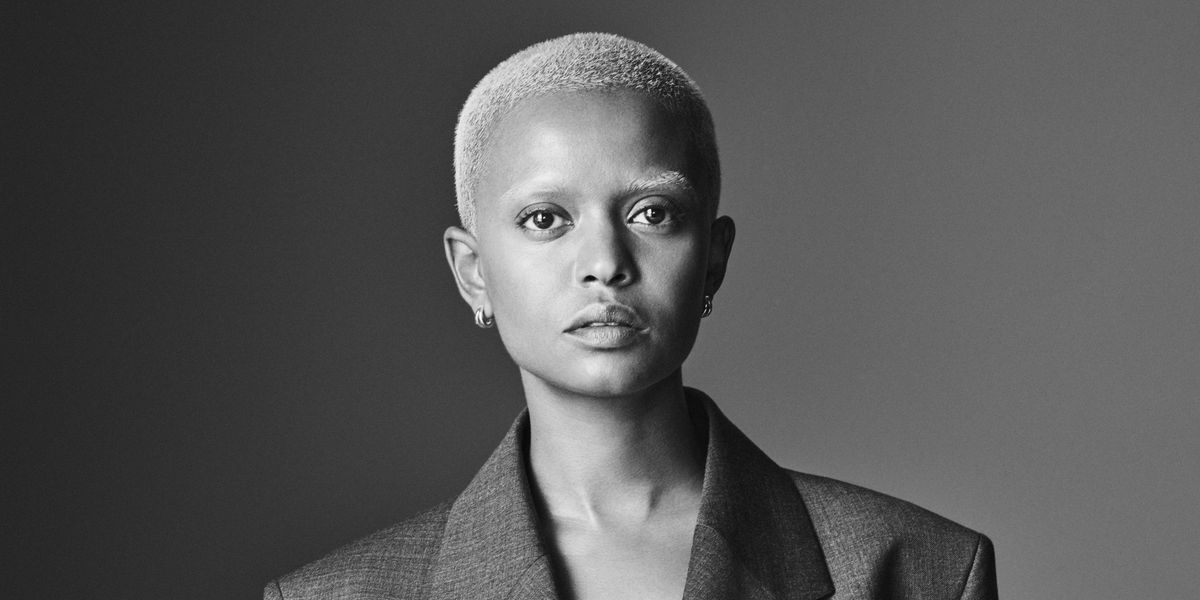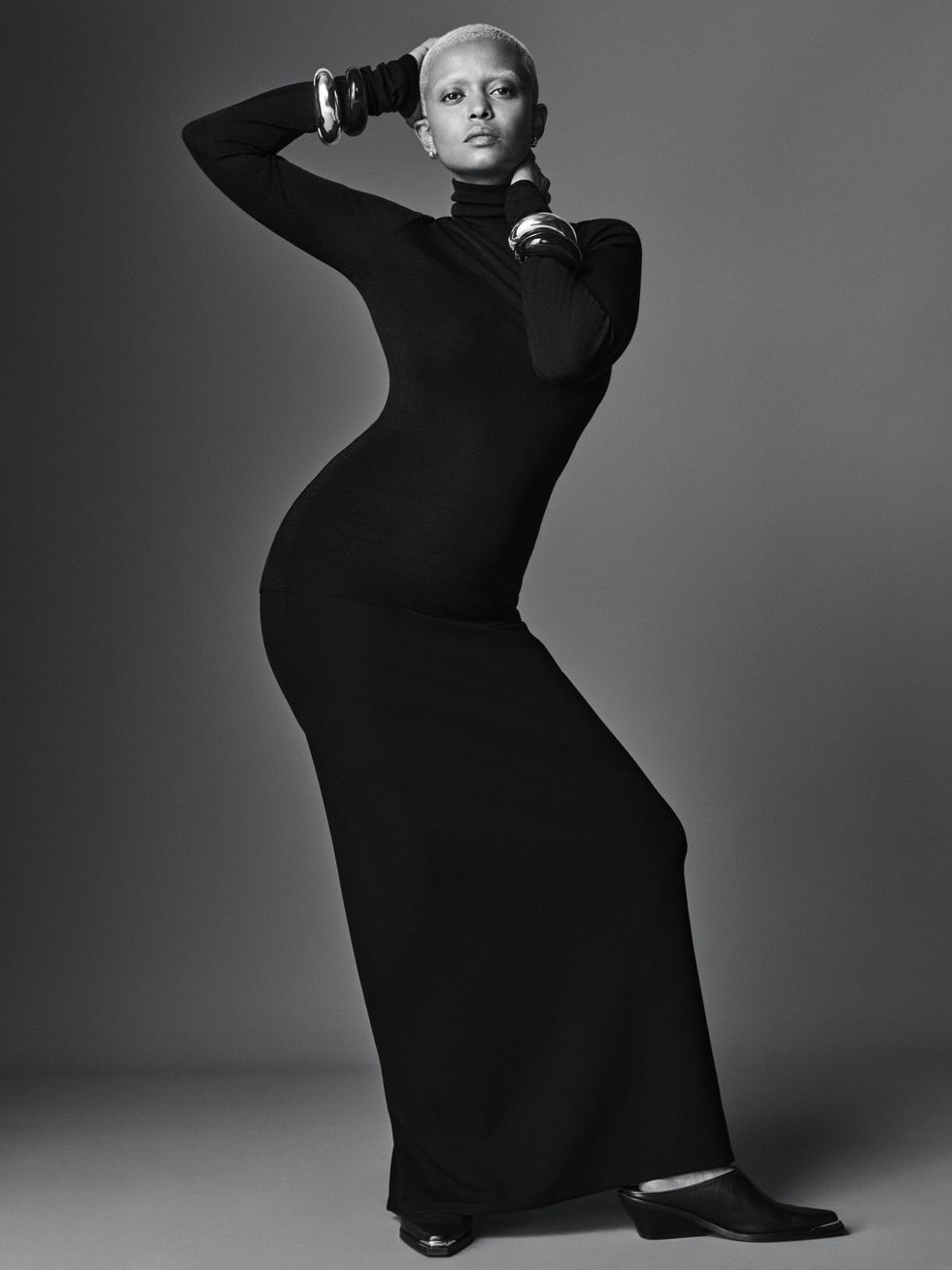When you think of Kelela, what image comes to mind? Maybe it’s the cover of her breakout mixtape, Cut 4 Me, with her then-signature undercut, or maybe it’s her in a blonde wig in the now-cult music video for “LMK”? Perhaps it’s her in a luscious strawberry red wig at a Bottega Veneta show, or in a blunt Edna Mode-esque bob for Ferragamo? Her variety and ability to metamorphose through looks, eras, and seasons while still remaining herself to the core is a gift few visual artists have. The same can be said for her music: she is a rave queen, a club phenomenon that has shaped the sounds of the dance floor for the last decade, always one step ahead, proving everyone needs to catch up with her, and not the other way around. The through line is a vulnerability and honesty that has quickly made her a darling of both the music and fashion industries.
After releasing her album Take Me Apart in 2017, Kelela went underground and emerged about a year ago with a new look: a buzzed head. It’s provided a new canvas for her to experiment with different personas, or be in her “wig era,” as she calls it. But, for her turn as a campaign star for COS’ latest fall collection, she decided to forgo head coverings and present as her true self. It matches the collection to a tee: laid-back yet polished pieces, with just the right amount of texture and sophistication to last through trends and become permanent installations in your wardrobe.
Kelela’s stamp of approval is not one that comes lightly, as she is incredibly selective about who and what she gets behind. COS recently celebrated its fall collection with a runway show in New York, which she sat front row at, naturally. Before fashion month kicked off, ELLE.com caught up exclusively with the singer to talk about returning to the spotlight, doing things on her own timeline, her devoted fan base, and the powerful tool and language that is fashion.
What has the last year been like for you on hiatus?
It’s a beautiful feeling to make contact with my fan base and the people who have been supporting me; I feel like I’ve picked up where I left off. During the pandemic, when I was on a hiatus, [I was] really not posting on the internet, which back in the day was a normal thing for a lot of artists. But now, if you’re not posting, it means you don’t want to exist in music. I remember people were evoking my name without me having to participate. It was really interesting to see what that connotes—what it means to be a Kelela fan and what people would say when they’re recalling a song or referencing something about me. It showed me something about the community that I built on some level. When we’re sharing on the regular and constantly putting new stuff out, you don’t know if people are responding to it being new, or if it’s working for you and if it is sustainable. It was fulfilling to see the music was working for them, even when I was not participating in the conversation. My fans are so wholesome and very cute, and have so much style but also are kind. There’s a kindness and—this is maybe presumptuous—there’s a good value system that you’ve got to have into in order to really get into Kelela. And I love that.
When you performed on The Tonight Show Starring Jimmy Fallon, you seemed to do it authentically on your own terms. Do you ever feel pressured to rise to a certain commerciality?
Yeah, there is a pressure. Absolutely. To come with “more.” For any artist in this day and age, that’s a prompt that’s following us everywhere we go. But you want to experience growth, and things getting bigger and feeling more grand. But a good creative director, and anybody who works on creative in general, is the one who can find a place that intersects that and holds both things to be true. Something that feels big while also driving the point home that this is the whole thing: it’s this person singing their heart out, and that’s what it is.
You’re hitting fashion month in full force. As you use fashion as a tool to express yourself, how have you approached picking out looks?
I’ve been working with my stylist, Mario Horne, on shows from the first tour to now. The story that we’ve been wanting to build was the black looks, and now it’s opened up for the summer. It’s about expressing a mood and a story. Even if it’s an imagined story, when you’re looking at the look, and you don’t know what’s really going on, there’s so much wonder in that. I love finding the look that matches the place that I’m coming from in a moment. The era that I’m in—I’ve been calling it my “black dress, blonde hair era”— now it’s evolved into this new thing. I’m gonna bring the bayang back. There are certain things that feel like summer, and it’s a delicious thing to play with, in addition to making music.
You’ve been a supporter of many burgeoning fashion creatives over the years, like Maximilian at his namesake label and Ferragamo, and Telfar, Luar, and Kingsley, who you wore at one of your recent shows. How important is it for you to support these designers through your performances and your work?
It’s a really big deal, and it felt very natural. When I started to make the music that I made, I met a bunch of people who existed in an informal collective. That’s how I would describe it, because it was more close-knit than, say, hanging out sometimes because we make stuff. We were all friends and it’s a tight-knit hang, and everybody happens to be killing it. One of my first big gigs was opening for Solange at Webster Hall. It was two dates a week apart. For the first show, I wore this Telfar sweatshirt that had two pieces: one piece around the waist with a big hole in the middle, and then a top piece. I was just looking at innovative, cool-looking clothes that my friend made, and he was saving me. And then the next week, it was Hood By Air. I remember it was an obscenely long-sleeved white crop top—the sleeves went to my knees—and it was perfect because I was grabbing the mic over the sleeve. Support marginalized designers and creatives is really important to me.
And when one of you experiences success, it’s not just one of you—you’re bringing everybody with you.
Period, exactly. That’s how it works. It’s surreal, very surreal…it’s surreal when I look around and I’m constantly inspired by my peers. I feel rejuvenated and I experience so much renewal around my fellow creatives. So, it’s paramount for finding that drive to keep going.
This is your first time working with COS. What drew you to this collaboration in particular?
COS is giving chic for the people. I can get behind that. There are so many people that exist in that space where it’s like, “I want something nice, I want it to feel chic.” It’s basics that just hit. It’s cut perfectly. It does the thing that it needs to do. I think it’s really incredible. It’s always been incredible design, just at a base level, like, this is a great jacket.
If you were to stage a Kelela retrospective of your greatest fashion looks, what would be included?
Oh man, that is a really good question! Walking down the steps at the Met Gala in sparkling Paco Rabanne. That was a moment. The eye makeup that Raisa Flowers went crazy on. There’s this one Dries pajamas look that I did—it was September 2018, so I guess spring/summer 2019, with the the white Tabis, and the hair up and that Y/Project earring. Now that I’ve entered my wig era, it means there’s another set of characters. There’s a little girl inside me that low-key can’t believe that I am making imagery like the things I grew up looking at. It feels surreal.
How did you discover and hone your sense of style?
In the beginning of my career, it was hard to figure out, like, “What is my style?” Everybody around me was like, “This is the one thing that I do, and I do it really well, and that’s my angle.” For me, I felt like so many things: some days I just want to masc up and feel that top energy, then the next day, I want to feel very girly and I want to be in the crystal dress. It was hard for me to find the language. That’s why working with Mischa Notcutt was so significant for me developmentally as an artist, because she has such a wide range. She also saw that in me and was able to see it’s not just this one thing. Fashion and playing with it helped me find these different parts of myself, and what feels obvious now was very much a thing I didn’t have the language for before.
We know Björk is going to be wearing Noir Kei Ninomiya any day now.
I remember her saying something like, “For a year, I felt this way, so I only wore fluorescent colors.” It’s about how much you mean it, and how much you’re putting into it.
Sometimes in commercial music, fashion can feel glossed over or commercialized. But your fans are always ready to meet you where you are.
That’s the type of connection I feel like I have with my audience, and not one where they say, “We demand the thing that you always did!” That’s not what anyone wants from Kelela, and I’m so happy that I established that out of the gate, because it makes it so that everybody who’s into it is here for the range. You’re tuned into me because you’re like, “I don’t know what it’s going to give next, but I have faith that this hoe is not playing, because she will deliver.” That’s the type of trust that I’ve always wanted to build with my audience. My fans say, “I don’t know what Kelela is doing right now, but I know that she’s doing whatever it is that she’s supposed to be doing to create the next thing that is gonna hit for all of us. So I’m just gonna go back to Take Me Apart. We are ready whenever you are.”

Kevin LeBlanc is the Fashion Associate at ELLE Magazine. He covers fashion news, trends, and anything to do with Robyn Rihanna Fenty.

